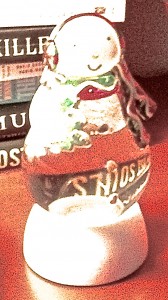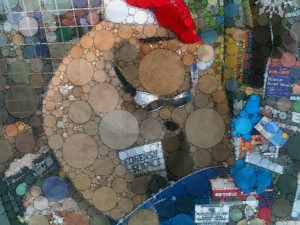
 Every culture tells stories. We keep our history alive this way. We all have rituals, whether they are secular or deeply religious. When you’re worldbuilding, you can communicate a plethora of culture and history through the traditions and festivals your characters observe.
Every culture tells stories. We keep our history alive this way. We all have rituals, whether they are secular or deeply religious. When you’re worldbuilding, you can communicate a plethora of culture and history through the traditions and festivals your characters observe.
Coming up on December 10th, I’ll teach Christmas in Narnia: Creating Traditions for Fictional Cultures for the Rambo Academy for Wayward Writers. Pardon the frosty pun, but a fictional holiday is an excellent tip to the iceberg of your world’s history. Consider the wealth of similarities and differences of the festivals of lights that originate from the Northern Hemisphere of our planet alone:
During the season of autumn into midwinter, things get darker and colder in most of the NH. The further north you go, the more stark that dark and cold becomes. Many traditions originating in the Northern Hemisphere have celebrations and rituals revolving around light and warmth at this time. India and its diaspora bring us Diwali and Deepavali, two different but similar multi-day festivals of lights, color, and life. Judaism celebrates Hanukkah as the observance of a historical miracle”“eight nights of light produced from barely any fuel oil. A fun side note: we eat fried foods like latkes and donuts on Hanukkah to represent the bounty of the oil! Who wouldn’t love a holiday that prescribes feasting on greasy carbs?
On Christmas, people celebrate the birth of the Christ child, destined to bring light, love, and goodness into a harsh world. As Christianity spread through Europe, this tradition appropriated, fused with, and replaced several midwinter traditions, such as the birth of God of the Wood on the winter solstice. This nature-based deity literally brings the light and warmth back into the world as the days finally grow longer instead of shorter. In addition to a festival of eating and drinking (lots of drinking), popular Christmas tradition involves putting candles and electric lights on everything, particularly an evergreen tree. That tradition did not come from Nazareth.
Notice that these traditions change over time and will even be different in each family or community. Just as no ethnic group is a monolith, neither is any religious or secular culture. There’s so much room here for worldbuilding, not to mention internal as well as external conflict. Some progressive Jewish families have introduced an orange among the symbolic food (roasted egg, lamb bone, bitter herb, et al.) of the Passover Seder plate, meant to remind us of the struggle of women, lgbtq+ folks, and people of color in Judaism as well as all who face intersectional struggles and are often left out of the popular image of the Jewish community.
I have a Jewish mother and an essentially Unitarian father. I grew up with secular Christmas as well as a heritage-rich Hanukkah, but I’ve always gravitated toward Pagan traditions. As a kid, I was particularly smitten with the Egyptian and Greco-Roman pantheons and stories, and I assume this is because I grew up in Miami, Florida. Flowers, fruit, and flowing water made more spiritual sense to me than the scarcity theme prevalent in Abrahamic traditions. This is the sort of subtlety that can communicate the history of a culture; temperate or tropical traditions are more likely to celebrate abundance and indulgence. Desert cultures are more likely to emphasize struggle, scarcity, and abstinence, but also patience and most importantly, charity. It’s no coincidence that Islam, Judaism, and Christianity share these values and emerged from cultures living under harsh political and geographical conditions.
This brings us to another important subtlety of cultural norms. How hot is “hot?” How cold is “cold?” For that matter, how far is “far?” Does “nice” mean polite and friendly, or does it mean kind and empathic? These are the questions that shape so many nuances of a community and its culture, whether macro scale or micro. And don’t overlook the secular traditions”“what does Tax Day tell us about capitalist cultures? What about the Queen’s Jubilee? For that matter, what about Juneteenth?
For more on this, please join me for Christmas in Narnia: Creating Traditions for Fictional Cultures on December 10th. Happy holidays!
Bio:
Evan J. Peterson is an author, game writer, and Clarion West alum. His latest book is METAFLESH: Poems in the Voices of the Monster (ARUS Entertainment), and recent work includes Drag Star! (Choice of Games), the world’s first drag performance RPG. His writing appears in Weird Tales, Arcana: The Tarot Poetry Anthology, and Queers Destroy Horror. Evan’s serial novel, Better Living Through Alchemy, will be published in 2023 by Broken Eye Books. linktr.ee/evanjpeterson can tell you more.
Site: www.evanjpeterson.com
Twitter: @evanjpeterson
Insta: @evan.j.peterson
...

Help them exercise their creativity. Provide them with clay, paints, fabric, glitter glue, sketchbooks, pens of magnificent and splendid color. Try Daniel Smith or the U. Bookstore for great selections.
A donation in their name to an appropriate charity. I like Heifer.org, Kids Need to Read, and Kiva.
For the power traveler perpetually on publicity tour, an Aerotray, a solar phone charger, a Tom Bihn bag, or a set of GoGear travel bottles.
Time. Either spend some time with them (take them out for lunch, dinner, to the zoo, up in a balloon, out for coffee and chat, on a cruise) or save them some time (sign them up for a delivery service, offer to baby-sit, help out with errands or household work). Or offer them proof-reading/copy-editing time.
Learning, via a gift certificate for my online classes. Right now through January 1st, 2014, mention this post on social media or in a blog (or spread the word some other way) and you’re entitled to a special deal. Buy two, get one free (one day workshops only) OR enroll in Writing F&SF or Advanced and get a free one day workshop.
Upcoming classes include the six week workshops Writing Fantasy & Science Fiction and Advanced Workshop and these one day workshops: Building an Online Presence for Writers, Character Building, Editing 101, First Pages Workshop, Flash Fiction Workshop, Literary Techniques for Genre Fiction, Moving Your Story from Idea to Finished Draft, and Podcasting 101. See here for dates.
...

A little history. One of my favorite reads this year was Bud Webster’s Past Masters: And Other Bookish Natterings. Bud’s book combines hearty doses of interesting history with some deliciously thorough reading lists, that will only lead you to more and more reading. Bud always managed to tell me something about the writers that I didn’t know but which shed more light (and interest) on the stories I already loved. Heartily recommended, particularly if you’re well-read in the SF field and want to know more about some of its greats.
A little inspiration. WonderBook: The Illustrated Guide to Creating Imaginative Fiction is a fabulous, gorgeous book about writing created by Jeff VanderMeer and Jeremy Zerfoss that will inspire and amuse. There’s a lot of writing books produced each year – this is not only the nicest of this year’s, but one well worth dipping into over and over again.
A little fuel. Writers usually require coffee. This year, due to this blog post by Chuck Wendig, I’ve become a fan of the Chemex coffeemaker. It’s got a nice little ritual to coffee-making that helps start the day right. Or a pound of fancy weasel-butt process coffee, if you want to go all out. Uncaffeinated writer? Get them a gift certificate and let them pick their own liquid.
A little efficiency. Dragon Dictate is dictation software available for Windows and Mac (although check what OS you’re running, a version hasn’t been released yet for the latest Mac update.) I love Dragon Dictate and think it makes me significantly more productive. It does take a little getting used to, but once you’ve worked with it a while, writing by hand feels archaic. And slooooooow.
A little notebook. Though it may seem unoriginal, writers always need notebooks. There’s a reason Moleskines keep being popular. Toss in a few fancy pens like this or these for a coordinated gift.
...
Want access to a lively community of writers and readers, free writing classes, co-working sessions, special speakers, weekly writing games, random pictures and MORE for as little as $2? Check out Cat’s Patreon campaign.

"(On the writing F&SF workshop) Wanted to crow and say thanks: the first story I wrote after taking your class was my very first sale. Coincidence? nah….thanks so much."

In this Medium article, Cat Rambo talks about her present to herself for her 60th birthday — a new tattoo.


This site is protected by reCAPTCHA and the Google Privacy Policy and Terms of Service apply. This site is a participant in the Amazon Services LLC Associates Program, an affiliate advertising program designed to provide a means for sites to earn advertising fees by advertising and linking to Amazon.com.